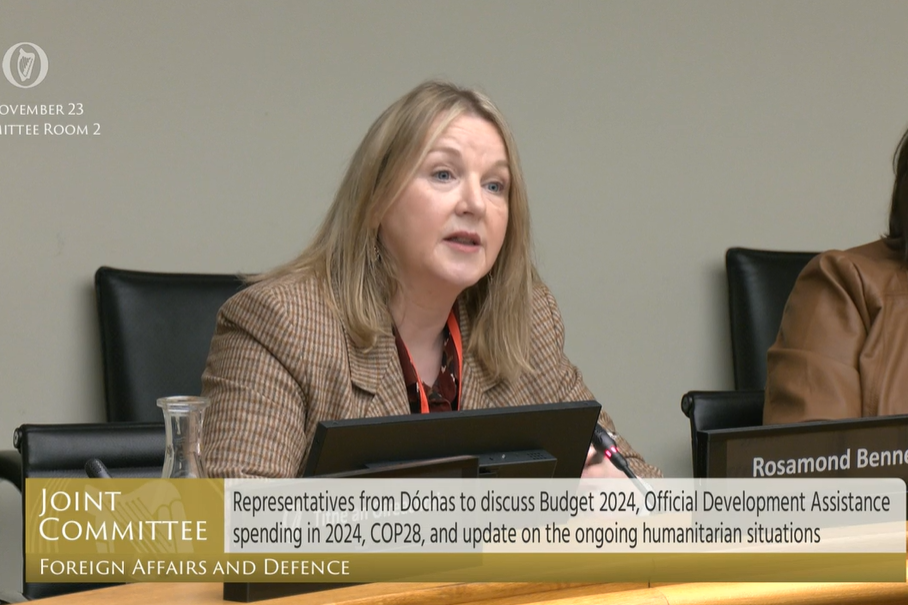Irish aid workers describe ‘living hell’ in Gaza as ‘trickle’ of aid arrives
Rosamond Bennett said more children had been killed in the Gaza Strip since October 7 than in all wars around the world since 2012.

Irish aid groups have said “only a trickle” of humanitarian aid is getting into the Gaza Strip and it is meeting “a fraction” of that needed by its population.
The Israeli bombardment of the Gaza Strip has led to an unprecedented humanitarian crisis in the region, with food, water, fuel and medicines extremely limited.
The military operation was launched in response to an attack by Hamas militants who killed 1,200 Israeli citizens and are thought to have kidnapped around 200 others, including Irish-Israeli citizen Emily Hand.
The closure of the strip amounts to collective punishment on an unprecedented scale on an already vulnerable and impoverished civilian population
Representatives of Dochas, Trocaire and Concern addressed Irish parliamentarians and senators on Tuesday during a meeting of the Foreign Affairs and Defence Committee.
As well as highlighting the dire humanitarian conditions in Gaza, they also raised concerns about other conflicts in the world and the need to help nations respond to conditions created by climate change.
Finola Finnan, deputy chief executive of Trocaire, said there was only a “trickle of aid” going into Gaza as only the Rafah crossing at the Egyptian border was partially open, while the two Israeli crossings remained closed.
Speaking about the 10 million euro donated to the United Nations Relief and Works Agency (UNRWA) for Palestinian refugees, and 3 million euro to the Office for the Coordination of Humanitarian Affairs (OCHA), she added there was “no suggestion that that funding is doing anything other than… for the purpose for which it is intended, and there is good due diligence to ensure that”.
Ms Finnan described the conditions as “catastrophic” and “a living hell”.
She told the committee: “The trickle of humanitarian assistance entering from Egypt meets only a fraction of people’s needs. The closure of the strip amounts to collective punishment on an unprecedented scale on an already vulnerable and impoverished civilian population.
“Since October, we’ve had about 1,320 trucks have gone in, only 4% of the daily average volume prior to the current hostility, so there’s very little aid going in.
“At the moment, we’re waiting to scale up and we absolutely need a cessation of the bombardment on the population to be able to scale up to anything like we need.”
She said her organisation was “deeply concerned” by the escalation of violence and displacement in the West Bank, and there was very little aid going to the north of the region.
Ms Finnan paid tribute to Viola, a worker with Caritas Jerusalem, described as “a vibrant young Palestinian lab technician”, who died with her husband and baby daughter in an Israeli bombardment while sheltering in a church in Gaza.
She also mentioned Vivian Silver – a former board member of Trocaire’s Israeli partner B’Tselem and a co founder of Women Waging Peace – who was killed in the October 7 attack by Hamas.
Rosamond Bennett, chief executive of Christian Aid and chairwoman of Dochas, told TDs and senators that the first thing they do each day is check if their staff are still alive.
Even before this, about 80% of the population rely on humanitarian aid
She said that 160 children are being killed every day, and that more children had been killed since October 7 than in all wars around the world since 2012.
She added that she remembers being shocked at the amount of rubble in the Gaza Strip when she visited the enclave in 2013 and cannot imagine how it is now, or how it could be rebuilt.
“I was in Gaza in May, and the need is huge there. Even before this, about 80% of the population rely on humanitarian aid. And as Finola said, there are very few trucks going in compared to what there was previously,” she said.
Ms Bennett said it is “very difficult” to get public funding for humanitarian crises in Yemen, Syria and Sudan as those conflicts are not raised as often in the media, meaning that government funding is crucial in these cases.
Dominic MacSorley, humanitarian ambassador at Concern Worldwide, speaking by videolink from the Chad border with Sudan, said there was a need to “move on” from Ireland focusing on one international crisis at a time.
Bookmark popover
Removed from bookmarks